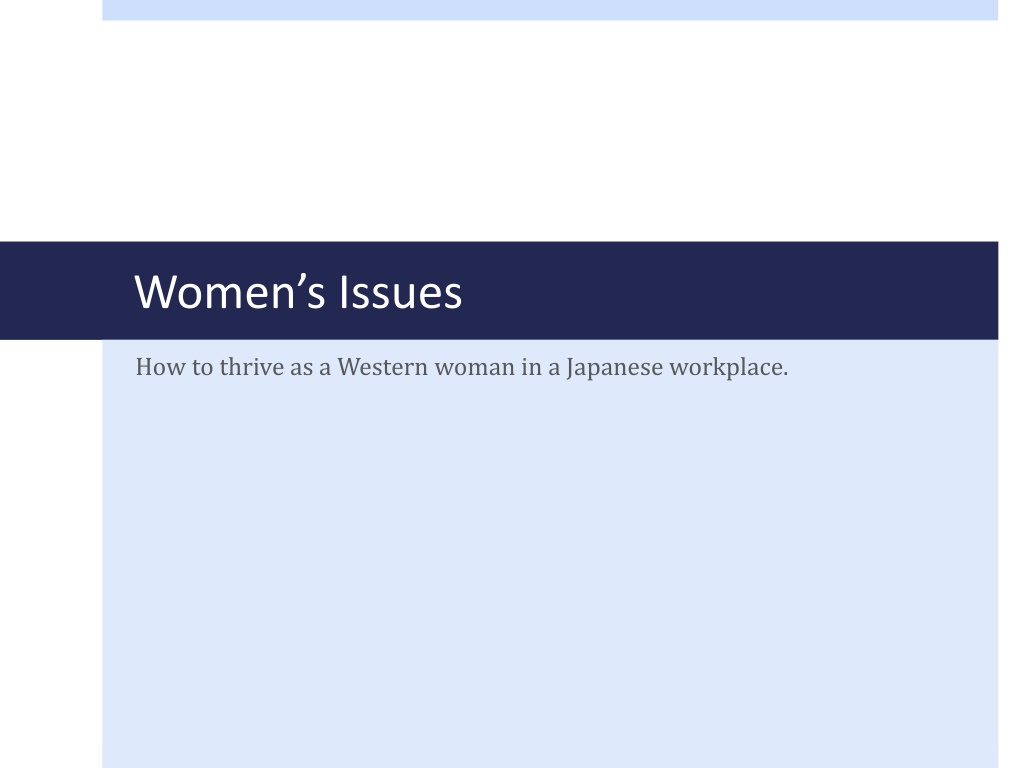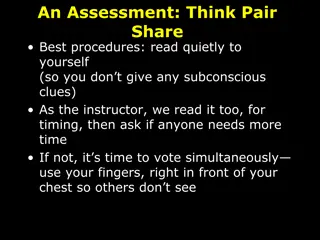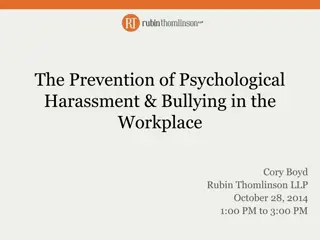Thriving as a Western Woman in a Japanese Workplace: Overcoming Challenges and Setting Boundaries
Navigate the unique challenges faced by Western women in Japanese workplaces by setting personal boundaries, recognizing and addressing harassment, and understanding cultural nuances. Learn about Japanese employment laws, sexual harassment guidelines, and strategies for dealing with inappropriate behavior.
Download Presentation

Please find below an Image/Link to download the presentation.
The content on the website is provided AS IS for your information and personal use only. It may not be sold, licensed, or shared on other websites without obtaining consent from the author. Download presentation by click this link. If you encounter any issues during the download, it is possible that the publisher has removed the file from their server.
E N D
Presentation Transcript
Womens Issues How to thrive as a Western woman in a Japanese workplace.
Self-introductions! Katie Strong (so you don t have to try and remember for the survey)
Goals Set your own personal boundary for what is and is not acceptable Learn how to recognize when that line has been crossed Become acquainted with strategies for dealing with situations that may arise Develop the ability to analyze and react to situations in a culturally appropriate way on your own Provide a safe place for discussion
A brief legal history 1985 Passage of Equal Employment Opportunity Law in Japan 1989-1992 first sexual harassment lawsuit 1997 first introduction of sexual harassment guidelines EEOL revised to require employers to give consideration to sexual harassment prevention 90 s-00 s Japanese society begins to transform 2007 EEOL is heavily revised
What does this mean for me? YOU ARE RIGHT!
Is This Harassment? Game Your boss addresses your male friend instead wants to ask you a question. of you when he Your students comment on your appearance several times a day. A coworker is prevented from sitting next to you because he has to sit at the boys table . During class, when you walk over to help a student with their work, you see a drawing of an unclothed woman labeled with your name that they have been working on. At a work party, your vice-principal gets drunk, and starts shouting that he loves you and begging you to come over and give him a hug. Your students ask you about your bra size.
Lets Define: Sexual Harassment Physical conduct: violence, contact, demanding sexual favors by making job-related threats Verbal conduct: comments on your appearance, age, private life, and so forth. Sexual comments, jokes, or advances. Repeated social invitations (that are not desired). Sexist insults, and paternalistic or condescending remarks. Non-verbal conduct: displays of an explicit nature, gestures, or whistling Guideline: is the action unwelcome or unreasonable?
So, how do we deal? First draw a line: What is and is not okay with you?
Okay or Not? The bell rings for class to end, but your JTE is struggling to get the students attention so that they can bow and end class. In an effort to get them to look forward, she says look at the beautiful person in class. When the students then look forward, she says, I know that if I said that, you would all look at [the ALT] .
Okay or Not? You arrive at class before your JTE does. While you are chatting with some students, you notice a group of boys gathering in a corner. When you look over, you see them staring at your chest and gesturing to it, while loudly discussing different fruit. After class, when you are leaving, they call you melon in the hallway.
Okay or Not? You have a new JTE, with whom you typically communicate in English. One day, he sees you studying Japanese at your desk during your break time. After that, he tells you that, while the English practice he gets speaking to you is useful to him in his job, you need the Japanese practice, so in order to help you, all future communication with him must be done in Japanese.
Strategies Your JTEs are your liaisons Don t allow yourself to be silenced Know your chain of command Don t be complicit Gaijin smash! (no, really) Finally, remember that you are a role model to your students
Who do I talk to if? Your JTEs and Supervisor are your best school resource. Okinawa Support Network: Women s Issues Representative this year, me. 080-6494-9911 Okinawa PAs Elizabeth in particular has experience dealing with these issues and knows channels to take CLAIR JET Line 03-5213-1729 Tokyo English Life-line 03-3498-0261 JET Peer Support Group 050-5534-5566 098-854-1172 0570-070-810

















































